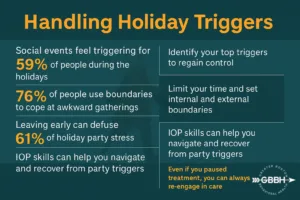The holidays aren’t always joyful. For many, especially those navigating mental health challenges, this season can feel like a trap wrapped in tinsel. You may have already been in treatment, made progress, and then—for any number of reasons—paused or walked away from your Intensive Outpatient Program (IOP). Now the invitations are rolling in, the pressure is mounting, and you’re wondering how you’re supposed to “handle” it all.
If this sounds like you, you’re not alone. And you’re not locked out of support just because you stepped away.
Holiday parties, family gatherings, and seasonal events bring up more than just old traditions—they stir up anxiety, discomfort, and emotional triggers that many aren’t ready for. But there are ways to move through these moments without losing your footing—and one of the best supports for staying grounded (or returning to center) is re-engaging with an Intensive Outpatient Program.
Let’s walk through practical, compassionate steps for handling holiday triggers, followed by what it means to come back to care if you’ve ghosted, paused, or fallen off.
1. Get Honest About Your Holiday Party Triggers
It’s not weak to feel anxious about social events. For many, holiday parties carry a hidden weight—expectations, social obligations, reminders of old roles or wounds. When your nervous system is already on edge, these environments can push you toward shutdown or escalation fast.
Common triggers at holiday parties include:
- Small talk that feels invasive: “So, what have you been up to?”
- Judgmental family members or past social groups
- Alcohol or overstimulation
- Fear of being asked about your mental health or treatment history
- Internal pressure to “be okay” for everyone else
These aren’t just personality quirks—they’re nervous system responses that deserve attention. When you name them, you start regaining control over them.
2. Create a Grounding Game Plan Before You Go
Walking into a high-stress situation without support tools is like heading into a snowstorm without a coat. Preparation matters.
Try this three-part check-in before attending a party:
- What’s your emotional state right now? (Anxious, numb, irritable?)
- What kind of support might you need? (A friend on standby, a plan for when to leave?)
- What’s one thing you can control? (Your arrival time, who you talk to first, how long you stay.)
You don’t need to control the whole event. You just need to know what will help you stay connected to yourself during it.
3. Practice Gentle Exit Scripts
You don’t need a dramatic excuse or a backstory to leave. You’re allowed to go home when you’ve had enough. That said, many people avoid leaving because they don’t know how to excuse themselves gracefully.
Some pre-planned lines that work:
- “I’m so glad I came. I’m feeling a little maxed out, so I’m heading out.”
- “I made a deal with myself to keep tonight lowkey—I’m proud I showed up at all.”
- “I’m listening to my body, and I think it’s time to rest.”
These short, honest statements work because they respect your own needs and sidestep over-explaining.
4. Set Boundaries—Internally and Externally
Boundaries don’t always have to be declared out loud. Sometimes, it’s enough to set them for yourself before the party.
Examples of internal boundaries:
- “I’ll stay for one hour, then check in with myself.”
- “If I start spiraling, I’ll step outside before it snowballs.”
- “I don’t owe anyone an update on my treatment.”
If you know someone might push your boundaries, consider setting external limits too:
- “I’d rather not talk about that right now, but I’m happy to catch up on other stuff.”
- “Let’s save this conversation for another time.”
- “Thanks for asking, but I’m working on staying present tonight.”
Every time you hold a boundary, you’re reinforcing your own safety and growth.
5. Use IOP Skills Before, During, and After the Event
When you’re in an Intensive Outpatient Program, you learn real-world tools—not just theory. These coping strategies don’t disappear just because you’ve stepped away for a while. You can still use them.
Before the party:
Use grounding exercises, body scans, or journaling. Set an intention: “I want to stay self-connected, even if I feel overwhelmed.”
During the party:
Anchor yourself with breathwork, small breaks, or supportive sensory tools (peppermint gum, a smooth stone, a fidget item in your pocket). You can also text a support person if needed.
After the party:
Resist the urge to overanalyze or criticize yourself. Instead, reflect gently: What went better than expected? Where did you feel anxious? What helped?
All of this builds your emotional regulation muscle—which is what IOP is designed to reinforce.
6. Normalize the Pause—and Re-Open the Door
If you left your IOP early, stopped responding to messages, or ghosted entirely—it’s okay.
We know how common this is. Life gets complicated. Work gets busy. Emotions feel too raw. Sometimes just walking into the building again feels like too much.
But we also know this: you’re not alone, and you’re not “off the list.”
Our IOP at Greater Boston Behavioral Health exists for people who want support without judgment. That includes those who step away and come back.
Whether you’re in the city or looking for an Intensive Outpatient Program in Dedham, MA, Newton, or Needham, you’re welcome here again—even if your return is quiet, uncertain, or full of mixed emotions.
7. Why IOP Is Still One of the Best Supports for Seasonal Triggers
There’s a reason IOPs are often the bridge between crisis and thriving—they give you structure without confinement. And during the holidays, that balance matters more than ever.
Here’s what IOP offers when triggers are high:
- Consistent support without full disruption to your work or personal life
- Structured routines that help regulate your nervous system
- Community care, so you don’t feel like the only one struggling
- Space to rehearse real-world situations—including what to say to Aunt Carol at the table
IOP is where you get to be honest about what’s hard and try again. No performance required.
FAQs About IOP, Holiday Stress, and Re-Engaging
I left my IOP without saying anything. Can I still come back?
Yes. You don’t have to explain everything. We understand that people leave for all kinds of reasons. We’ll meet you where you are now.
Is it normal to feel more overwhelmed during the holidays?
Absolutely. The holidays disrupt routines, heighten expectations, and often resurface unresolved emotions. If you’re struggling more now, it doesn’t mean you’ve gone backward—it means you’re human.
What if I can’t handle group therapy right now?
That’s okay. Many IOPs (including ours) offer individual sessions or a gradual re-entry. We can help you build back at a pace that works for you.
I’ve already “failed” at treatment once. How do I know this time will be different?
It might not be about doing it differently—it might be about doing it again, with more self-awareness. You’re bringing new insights, even if it doesn’t feel like it. That counts.
Can I start or rejoin IOP just for the holiday season?
Yes. Some people re-engage with IOP during high-stress times (like November–January) and taper off later. We’ll work with your goals and schedule to make it supportive—not overwhelming.
You’re Not Too Late. You’re Still Welcome.
If holiday parties have you on edge, if your emotions feel too big, or if you just miss having a space where you don’t have to pretend—you can come back.
No lectures. No shame. Just real support from people who still believe in you.
Call (888) 450-3097 to learn more about IOP services in Boston, Massachusetts. You don’t have to navigate this season alone.


